NFT marketplace has become a promising industry for passionate entrepreneurs looking for new industries to explore. But amidst all the hype, the real question remains: Is NFT trading necessary to develop? Changing consumer preferences and developing markets make it necessary to evaluate the profitability and sustainability of the business.
Entering the world of NFT business development is promising for developing a profitable business model. Further, since unique and disruptive innovations significantly affect early market success and long-term benefits in this industry, understanding the complexity of the development process is non-negotiable.
Further, as these assets gain more interest and value, investors are becoming more interested in the idea of starting their own NFT businesses. But before starting on this journey, it is important to understand NFT marketplace development services. Read to find the information you need:
What Is NFT Marketplace?
NFT trading offers an online platform where creators and buyers exchange immutable virtual goods using cryptocurrencies such as Bitcoin or Ethereum.
It facilitates transactions as a fee is paid each time an NFT is purchased from the platform. When purchasing, the buyer receives a token, a unique identifier that provides evidence of ownership of a particular asset.
Some NFT marketplaces include
OpenSea
Axie Marketplace
Rarible
Nifty Gateway
NBA Top Shot
These digital assets are secured and tracked using blockchain technology like Bitcoin and Ethereum. Although the copy of the content can be expanded, important information is still stored on the platform. The concept can be likened to a museum of artifacts, where only originals can be purchased and the original remains in its original location.
NFT Marketplace App Features That Influence The Development Cost
Building an NFT business requires strategic planning and a deep understanding. Although the development cost will vary according to your needs, understanding the factors influencing it can help you make the right choice. So let’s look at the factors that affect the costs of developing a strong NFT trading platform.
Choosing Blockchain Technology
Picking the right blockchain is essential. The choice of Ethereum, Binance Smart Chain, or emerging blockchains may affect the complexity and cost of the project. Each blockchain brings unique capabilities, scalability considerations, and cost implications that impact the entire development strategy.
Smart Contract Development
Smart contracts are the foundation of NFT transactions, and their complexity directly affects development costs. The complexities when hiring a smart contract development company come from the embedded functionality, including exchange logic, exchange strategy, and other specialized functionality. Paying attention to smart contracts and being more efficient can help improve the quality and the price.
User Experience
This is important for user participation in the NFT market. The challenge is to create content that resonates with users, making it relevant across devices and integrating it with interactive features. These design considerations can impact the overall construction cost and highlight the importance of user-centricity.
Security Measures
In blockchain development, it is important to use security measures to protect customers and maintain the integrity of the platform. Access, integration of secure wallet solutions, compliance with industry standards, and regular security audits all increase transaction-related costs to secure the NFT trading environment.
Mining and Token Standards
Supported token types (such as ERC-721 or ERC-1155) and the complexity of the minting process can affect development costs. Customizing token models to fit specific needs increases complexity. The choice of design and modification has an impact on the development process and subsequent costs.
Integration of Advanced Features
Advanced features such as decentralized finance (DeFi) integration, gamification content, or social networking can be improved to adjust the overall demand of the NFT market. However, these additional features bring additional development costs. From DeFi protocol integration to gamification mechanics, each feature has its complexities, so the value they bring to the platform and their impact on the budget should be the same good idea
Development Strategy
You can start the development process from scratch or adopt a pre-built, tag-free NFT trading software solution. Choose the former to be fully responsible for the project, from designing the user interface to establishing strict security procedures. However, this method requires a significant investment of time and money. These pre-configured solutions come with simple functionality and security measures and allow customization to fit your business needs.
Blockchain Architecture
Choosing the right blockchain network is critical for NFT business growth. You go for an existing network like Ethereum, Solana, or BNB Chain, or start building a custom blockchain network that fits the specific needs of your NFT market. Additionally, the integration of smart contracts plays an important role in the development of the blockchain network. play an important role.
While the integration of various features can improve user engagement, it requires the expertise of experienced developers, thus increasing development costs. Additionally, multiple integrations can increase development time and require additional time and resources.
NFT Marketplace Development Monetization Models
NFT platforms typically charge between 1% and 5% of all NFT sales sold on their platforms. This fee contributes to the platform’s revenue while promoting safe transactions for users. There are also NFT trading fees that create price lists similar to oil prices on the blockchain. These fees are charged when users generate additional revenue for businesses by selling their NFTs on the platform.
Some platforms have introduced governance tokens to support users by offering various rewards such as buying, selling or holding NFTs. These tokens not only encourage user participation but also serve to generate revenue for the platform. NFT trading offers the opportunity to generate income by releasing collaborations with new artists or projects. They can also benefit from the platform by promoting third-party resources or services to their users. Advertising acts as an additional source of revenue while also increasing visibility and engagement within the platform ecosystem.
- Transaction Fees
- Listing Fees
- Governance Tokens
- Advertising Revenue
Factors that affect NFT Marketplace Development Cost?
The rapidly growing NFT market reveals make NFT platform development is the right choice. However, careful planning is essential before getting started. Here, we dive into four key factors to consider when building a strong NFT business.
Niche Market Selection
A detailed understanding of the NFT segment is important. The specific niche you intend to target, whether it’s art, collectibles, gaming, or virtual real estate tokenization, should be carefully defined. This helps you customize the platform’s functionality to meet the specific needs of your chosen audience. By choosing a niche, you can not only differentiate your business from existing competitors but also create a unique position in the NFT ecosystem.
Target User Persona Development
Focus on the user model by carefully developing the target users. Conduct in-depth research to gather information about your ideal customer’s demographics, interests, behaviors, and unique needs. Using this user intelligence, you can create a platform that appeals to their interests and supports a better user experience. This will increase user engagement and retention, which is important for the long-term success of your business.
Technology stack optimization
The underlying technology architecture is the foundation of the NFT market. Property selection should be carefully considered. Key points in the evaluation include the suitability of the blockchain infrastructure, the performance of smart contracts, the performance of the solutions and the compatibility of the root end. Prioritize security, scalability, seamless interoperability with external systems, and strong developer support to ensure the
Compliance
Changing laws surrounding blockchain software development companies and cryptocurrencies require a way to comply with governance. You must have a good understanding of the laws and regulations surrounding NFT trading in your jurisdiction. This includes intellectual property agreements, data privacy, anti-money laundering (AML) and know-your-customer (KYC). By following strict regulatory standards, you can easily win the trust of your customers
What to Consider Before Building an NFT Marketplace?
Just like any website, adding features to your NFT marketplace directly impacts development costs. Focusing on core functionalities in the initial version helps manage the budget. Here’s a breakdown of essential features and their cost considerations.
User Authentication
Secure user accounts are a must for any marketplace. This includes registration, login, and profile management functionalities.
NFT Storefront
Showcase digital assets with detailed information like ownership, bidding history, previews, pricing, and descriptions. This feature significantly influences development costs depending on the level of detail and interactivity desired.
Search & Filtering
Enable users to efficiently navigate your marketplace by implementing search bars and filtering options. Consider factors like price range, popularity, and category filters to streamline the user experience. The complexity of search algorithms and filter options will impact development costs.
NFT Listing Creation
Empower users to upload and list their digital assets with relevant details such as titles, pricing, tags, and descriptions. The level of customization and automation offered in this feature influences development time and cost.
Auction System
Drive excitement and competition with an auction feature. This could include displaying auction details like expiration times, accepted tokens, seller information, payment methods, and real-time bidding status. The complexity of the auction system, including features like automatic bidding or proxy bidding, will affect development costs.
Integrated Wallets
Allow users to manage their NFTs and cryptocurrencies within your platform. While building in-house wallets requires significant development effort, integrating popular third-party wallets offers a more cost-effective solution.
Notification System
Keep users engaged with personalized alerts about new listings, upcoming auctions, and relevant updates. The sophistication of notification triggers and delivery methods will factor into development costs.
Reputation Management
Foster trust and credibility on your platform by incorporating a ratings and reviews system for both buyers and sellers. This feature requires careful design and security measures to prevent manipulation, impacting development costs.
Payment Options
Address global audience by offering diverse payment methods including credit cards, debit cards, and popular payment processors like PayPal, cryptocurrency wallets, and Stripe. The number and complexity of integrated payment methods will influence development costs.
Customer Support
Provide a reliable support system that can easily address inquiries and troubleshoot issues. This can be through a basic FAQ section or a 24/7 live chat support system. However, remember that the chosen support channel and its functionalities will affect development costs.
By carefully considering these core features and their cost implications, you can strike a balance between functionality and budget constraints for your NFT marketplace. Remember, you can always introduce more advanced features in future iterations as your platform grows.
Popular NFT Marketplaces And Their User Base
| NFT Marketplace | User Base |
| Opensea | More than 1 million registered users |
| Axie Marketplace | More than 1.8 million daily users |
| Rarible | Close to 2.1 million registered users |
| Nifty Gateway | Close to 1 million users |
| NBA Top Shot | More than 1 million registered users |
Development Cost of NFT Market Places
The development team will want you to spend most of your budget to develop the NFT Marketplace. The average NFT developer salary in the United States starts at $73,999 per year and gradually rises to $100,000 and $200,000. You will need a flexible budget to meet salary requirements. Outsourcing to an onshore developer will have the same effect, but outsourcing to a nearby developer will be equally distributed.
Here is the price breakdown of NFT development in these countries:
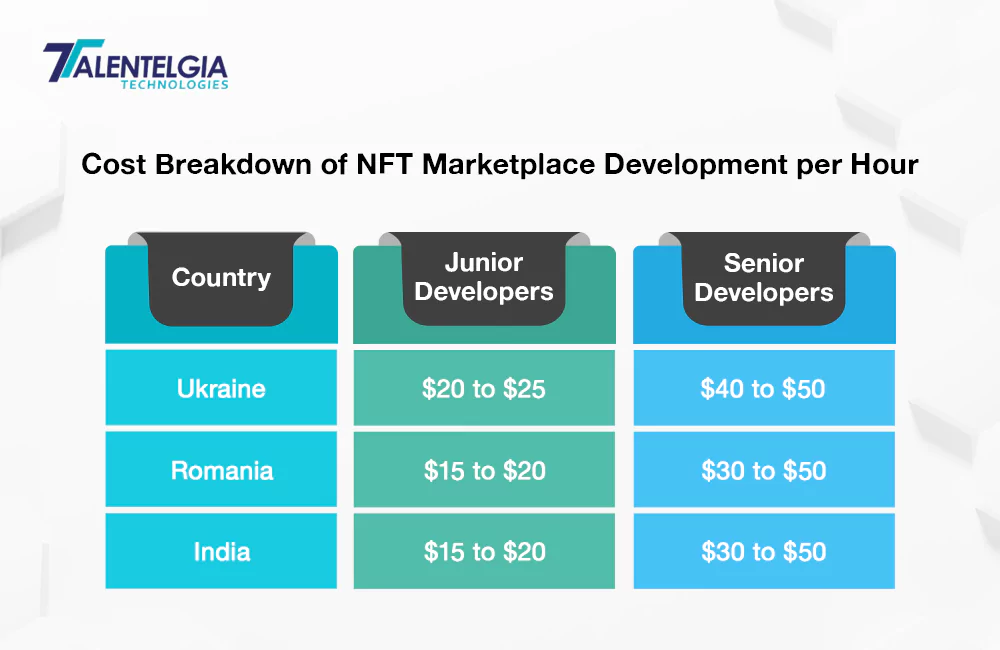
NFT Marketplace: Market Size & Future Prediction
Starting NFT development from scratch requires careful planning and execution to achieve good results. Although, it is a promising industry, understanding trends to make the right choice:
- NFT market revenue is expected to reach $3.369 billion in 2028, with an annual growth rate of 14.92%.
- The number of users in the NFT market is expected to reach 19.71 million by 2028. billion, the annual growth rate is 33.7%.
- Globally, the United States generated the highest revenue, ie, US $781,900 in 2023.
How to Develop a NFT Marketplace
While the popularity of the NFT marketplace is sky-high, building a marketplace from scratch requires careful planning and execution to be good. Don’t be misled by stories of complexity
Gather your team (or a trusted advisor) and brainstorm! Define who your target audience is; Are you appealing to digital art enthusiasts or the new generation of sneaker enthusiasts? Then carefully plan the features you want, from seamless streaming to intuitive search functionality.
Remember to create realistic budgets and timelines for your vision. Remember that user-friendly products increase loyalty and keep users coming back for more. Read below to know more!
Find Your Niche
Before you start laying digital bricks, it’s crucial to identify the hidden gem within your marketplace. Who are your target creators and collectors? Are you fostering a haven for digital art mavericks or the next generation of metaverse architects? Understanding your niche allows you to tailor features and functionalities that resonate deeply with your chosen community.
Define User Experience
Think of your marketplace as a digital gallery. It should not only showcase the importance of NFTs but also provide an experience that keeps users engaged. Research existing platforms, but don’t be afraid to stand out! Be careful when hiring your design team. A team of UI/UX design experts creates an interface that is user-friendly, intuitive to use, and appealing.
Building Blockchain Framework
This is where your vision starts becoming a reality. Finding developers with expertise in both client-side (user interface) and server-side (backend) development is essential for the development of any product. But don’t forget to focus on hiring the right blockchain experts when it comes to NFT marketplace development! Ensure your team can seamlessly connect your marketplace to the chosen network for transparent transactions.
Security Focus
Security is paramount in the NFT world. Think of your marketplace as a digital vault, safeguarding precious digital assets. Enlist the help of security experts to fortify your platform against potential vulnerabilities. Remember, a robust security system fosters trust and encourages creators to showcase their most prized works.
Error Analysis
Error-free output is critical to a good user experience. Leverage professional quality assurance (QA) testers to double-check your platform for any inconsistencies or defects. Resolving all issues before they are released to provide users with a good and safe experience.
Initiate and Iterate
Get Started! Open your store to the world and collect positive feedback from the first customers. Check out their experiences and use this knowledge to continually improve your platform.
Analyze their experiences and use this data to continuously refine your platform. The NFT landscape is constantly evolving, so embrace the iterative process. A successful NFT marketplace is a living entity, adapting and growing alongside its vibrant community.
Conclusion
If you have been waiting for the right time to start with NFT development, now is the time. Many app developers and marketers are trying to take advantage of this opportunity and stand out in the market. By understanding the costs of NFT business development, it is easier to build a strong platform. Trying to start your own NFT business is an idea that is slowly gaining traction, and it could be to your advantage to start getting involved in the market. However, it is important to understand its development cost and the factors that affect it. The blog above will help you understand NFT, its development process, and the factors affecting the cost of its development to make the right choice.


 Healthcare App Development Services
Healthcare App Development Services
 Real Estate Web Development Services
Real Estate Web Development Services
 E-Commerce App Development Services
E-Commerce App Development Services E-Commerce Web Development Services
E-Commerce Web Development Services Blockchain E-commerce Development Company
Blockchain E-commerce Development Company
 Fintech App Development Services
Fintech App Development Services Fintech Web Development
Fintech Web Development Blockchain Fintech Development Company
Blockchain Fintech Development Company
 E-Learning App Development Services
E-Learning App Development Services
 Restaurant App Development Company
Restaurant App Development Company
 Mobile Game Development Company
Mobile Game Development Company
 Travel App Development Company
Travel App Development Company
 Automotive Web Design
Automotive Web Design
 AI Traffic Management System
AI Traffic Management System
 AI Inventory Management Software
AI Inventory Management Software
 AI Software Development
AI Software Development  AI Development Company
AI Development Company  AI App Development Services
AI App Development Services  ChatGPT integration services
ChatGPT integration services  AI Integration Services
AI Integration Services  Generative AI Development Services
Generative AI Development Services  Natural Language Processing Company
Natural Language Processing Company Machine Learning Development
Machine Learning Development  Machine learning consulting services
Machine learning consulting services  Blockchain Development
Blockchain Development  Blockchain Software Development
Blockchain Software Development  Smart Contract Development Company
Smart Contract Development Company  NFT Marketplace Development Services
NFT Marketplace Development Services  Asset Tokenization Company
Asset Tokenization Company DeFi Wallet Development Company
DeFi Wallet Development Company Mobile App Development
Mobile App Development  IOS App Development
IOS App Development  Android App Development
Android App Development  Cross-Platform App Development
Cross-Platform App Development  Augmented Reality (AR) App Development
Augmented Reality (AR) App Development  Virtual Reality (VR) App Development
Virtual Reality (VR) App Development  Web App Development
Web App Development  SaaS App Development
SaaS App Development Flutter
Flutter  React Native
React Native  Swift (IOS)
Swift (IOS)  Kotlin (Android)
Kotlin (Android)  Mean Stack Development
Mean Stack Development  AngularJS Development
AngularJS Development  MongoDB Development
MongoDB Development  Nodejs Development
Nodejs Development  Database Development
Database Development Ruby on Rails Development
Ruby on Rails Development Expressjs Development
Expressjs Development  Full Stack Development
Full Stack Development  Web Development Services
Web Development Services  Laravel Development
Laravel Development  LAMP Development
LAMP Development  Custom PHP Development
Custom PHP Development  .Net Development
.Net Development  User Experience Design Services
User Experience Design Services  User Interface Design Services
User Interface Design Services  Automated Testing
Automated Testing  Manual Testing
Manual Testing  Digital Marketing Services
Digital Marketing Services 
 Ride-Sharing And Taxi Services
Ride-Sharing And Taxi Services Food Delivery Services
Food Delivery Services Grocery Delivery Services
Grocery Delivery Services Transportation And Logistics
Transportation And Logistics Car Wash App
Car Wash App Home Services App
Home Services App ERP Development Services
ERP Development Services CMS Development Services
CMS Development Services LMS Development
LMS Development CRM Development
CRM Development DevOps Development Services
DevOps Development Services AI Business Solutions
AI Business Solutions AI Cloud Solutions
AI Cloud Solutions AI Chatbot Development
AI Chatbot Development API Development
API Development Blockchain Product Development
Blockchain Product Development Cryptocurrency Wallet Development
Cryptocurrency Wallet Development About Talentelgia
About Talentelgia  Our Team
Our Team  Our Culture
Our Culture 
 Healthcare App Development Services
Healthcare App Development Services Real Estate Web Development Services
Real Estate Web Development Services E-Commerce App Development Services
E-Commerce App Development Services E-Commerce Web Development Services
E-Commerce Web Development Services Blockchain E-commerce
Development Company
Blockchain E-commerce
Development Company Fintech App Development Services
Fintech App Development Services Finance Web Development
Finance Web Development Blockchain Fintech
Development Company
Blockchain Fintech
Development Company E-Learning App Development Services
E-Learning App Development Services Restaurant App Development Company
Restaurant App Development Company Mobile Game Development Company
Mobile Game Development Company Travel App Development Company
Travel App Development Company Automotive Web Design
Automotive Web Design AI Traffic Management System
AI Traffic Management System AI Inventory Management Software
AI Inventory Management Software AI Software Development
AI Software Development AI Development Company
AI Development Company ChatGPT integration services
ChatGPT integration services AI Integration Services
AI Integration Services Machine Learning Development
Machine Learning Development Machine learning consulting services
Machine learning consulting services Blockchain Development
Blockchain Development Blockchain Software Development
Blockchain Software Development Smart contract development company
Smart contract development company NFT marketplace development services
NFT marketplace development services IOS App Development
IOS App Development Android App Development
Android App Development Cross-Platform App Development
Cross-Platform App Development Augmented Reality (AR) App
Development
Augmented Reality (AR) App
Development Virtual Reality (VR) App Development
Virtual Reality (VR) App Development Web App Development
Web App Development Flutter
Flutter React
Native
React
Native Swift
(IOS)
Swift
(IOS) Kotlin (Android)
Kotlin (Android) MEAN Stack Development
MEAN Stack Development AngularJS Development
AngularJS Development MongoDB Development
MongoDB Development Nodejs Development
Nodejs Development Database development services
Database development services Ruby on Rails Development services
Ruby on Rails Development services Expressjs Development
Expressjs Development Full Stack Development
Full Stack Development Web Development Services
Web Development Services Laravel Development
Laravel Development LAMP
Development
LAMP
Development Custom PHP Development
Custom PHP Development User Experience Design Services
User Experience Design Services User Interface Design Services
User Interface Design Services Automated Testing
Automated Testing Manual
Testing
Manual
Testing About Talentelgia
About Talentelgia Our Team
Our Team Our Culture
Our Culture
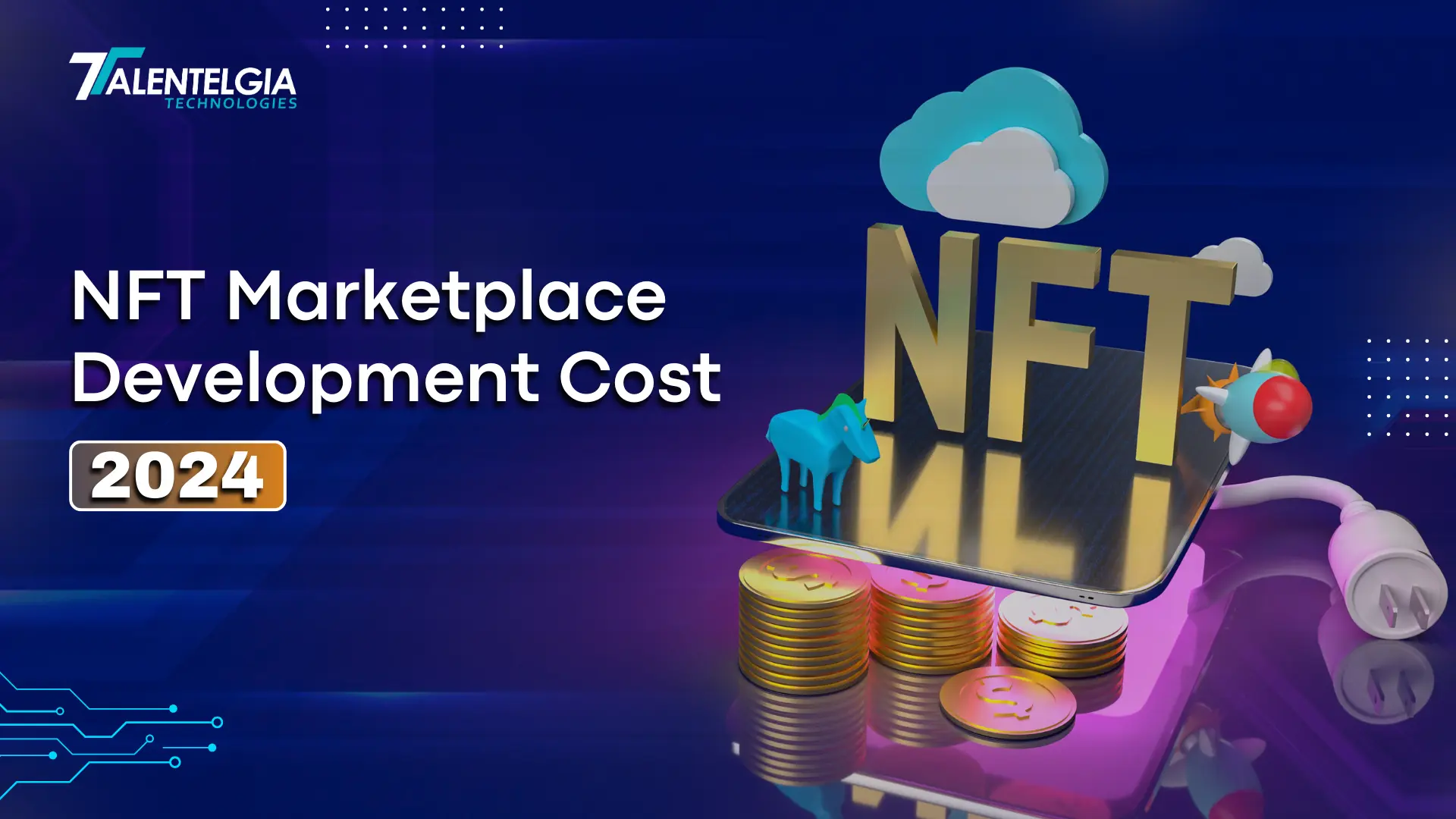

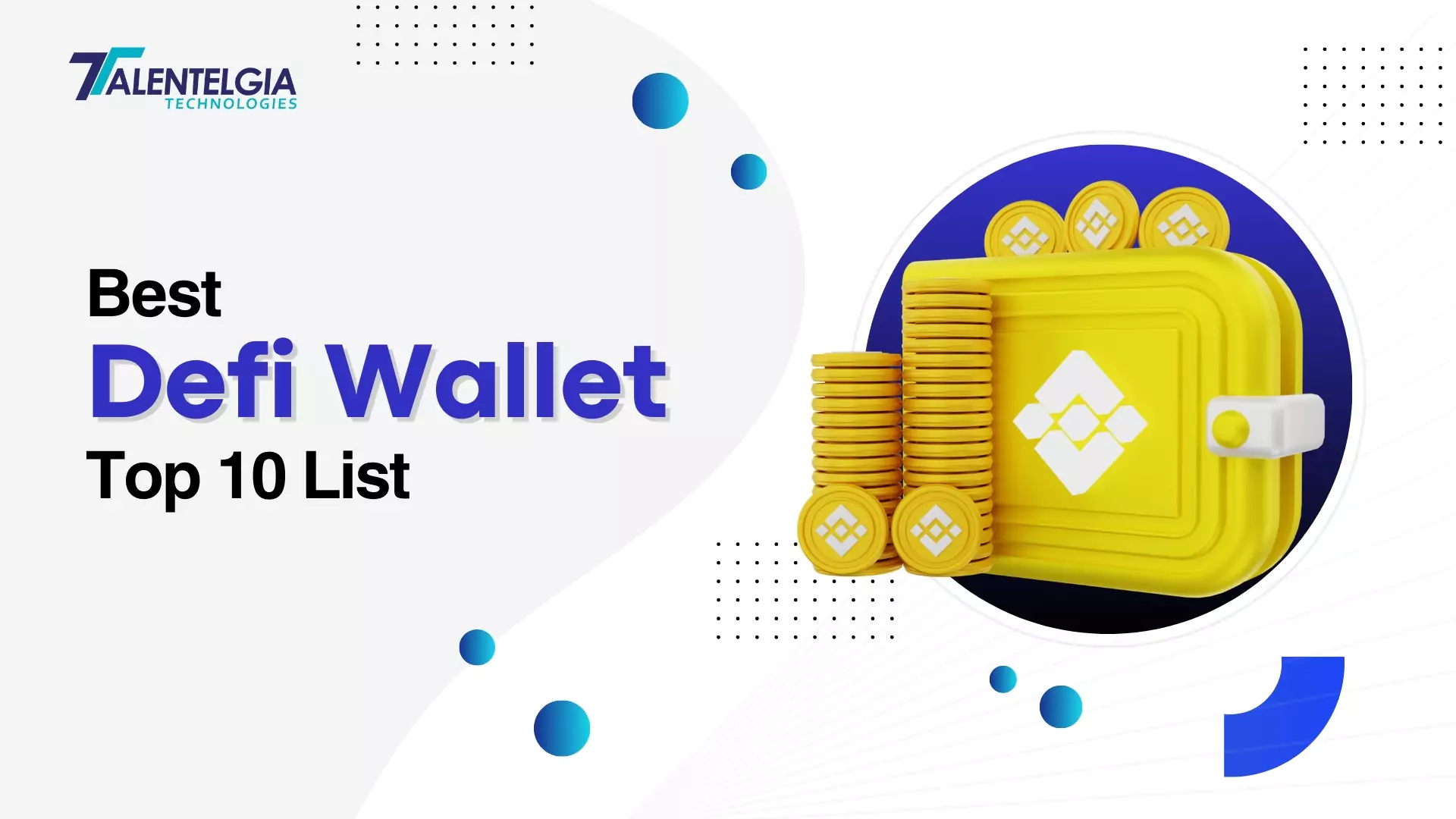

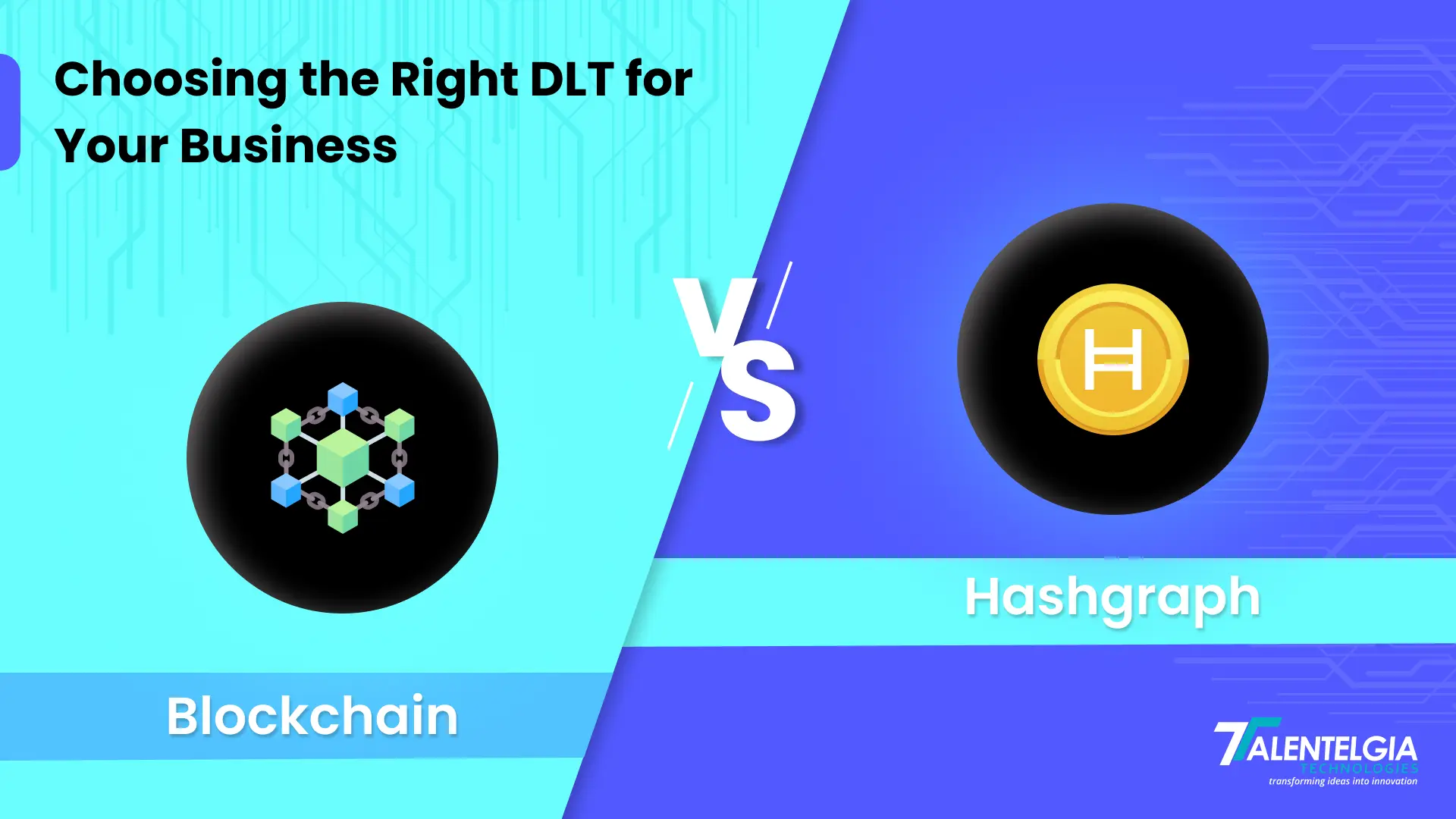
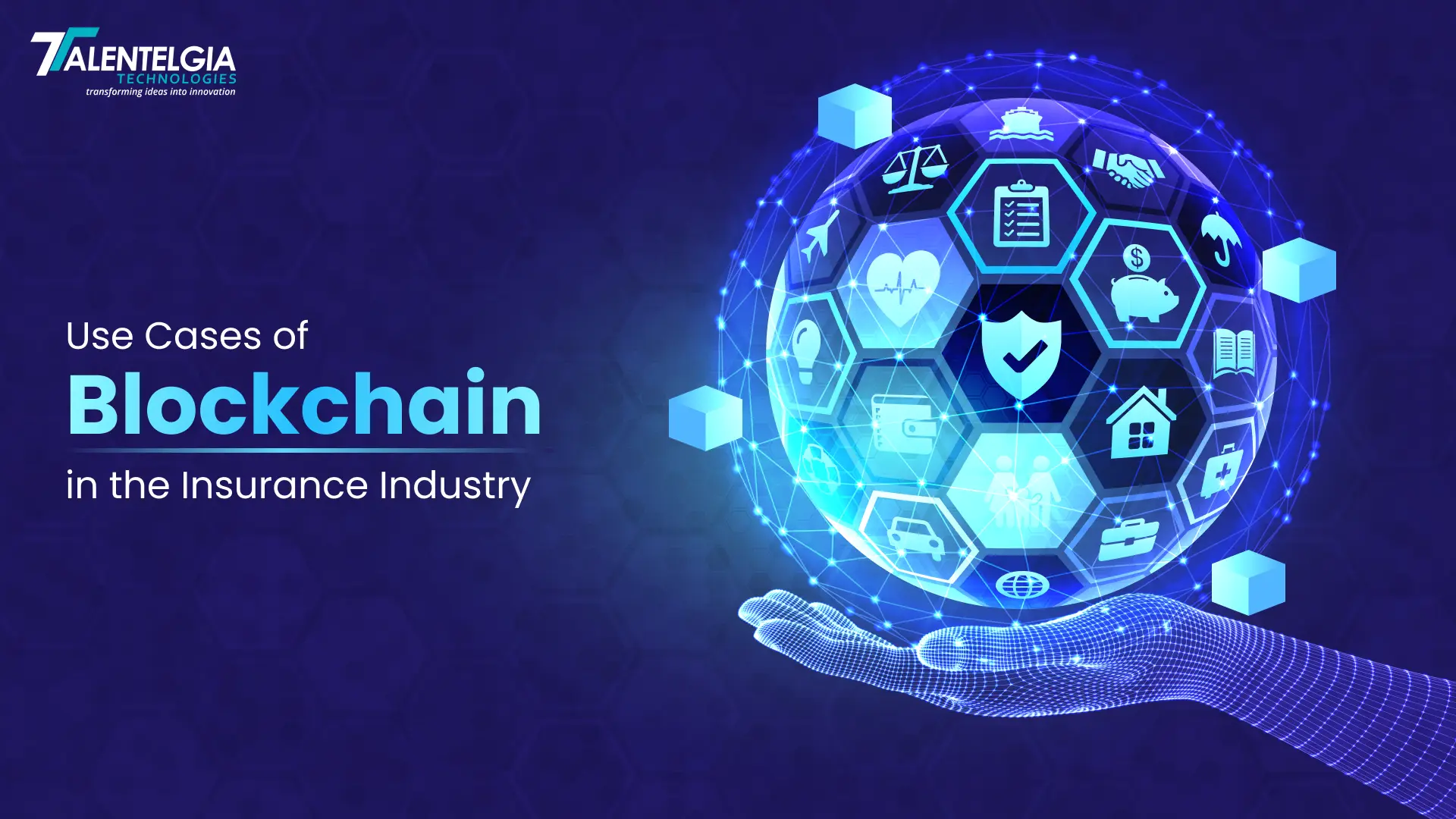











 Write us on:
Write us on:  Business queries:
Business queries:  HR:
HR: 





